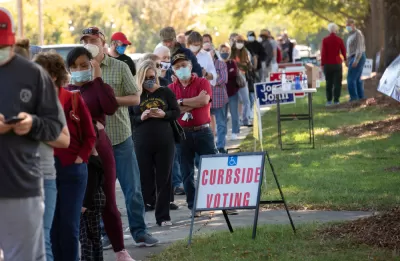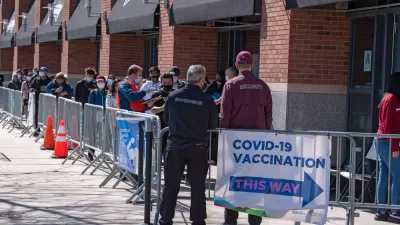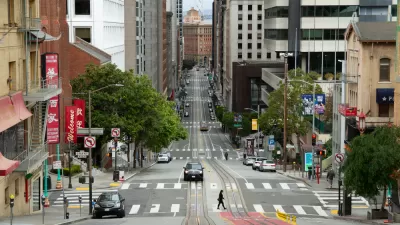This is Planetizen's seventh collection of articles on the subject of the future of cities in the wake of the pandemic, and how cities and communities are changing plans to respond to the many changes that world has experienced in 2020.

The sad and surreal sight of businesses boarding up windows and doors in anticipation of social unrest has become increasingly common as the United States hurtled toward Election Day, November 2020.
It's safe to say that when the calendar changed to 2020, back on the January 1, few, if any of us, anticipated anything but the election being the biggest story of the year. Now, anxious voters and the international community are forced to simultaneously navigate the brutal intersections of numerous, massive societal shifts. Planning ahead involves hunkering down until the dust settles from the election. Who could have planned for that?
Throughout the pandemic, Planetizen has been documenting the ongoing debate about the future of urbanism, planning, transportation, etc., so far sharing six previous compendiums of articles on the subject, with many more examples mixed in over the course of the year.
- Do We Know Any More About the Future of Cities Than We Did in April 2020? (October 2010)
- The Media Can't Stop Talking About the End of Cities (August 2020)
- The Great Debate: Will the Pandemic Alter the Course of Urbanism? (July 2020)
- Debating the Future of Cities After the Coronavirus, Volume 3 (June 2020)
- Density Debate Rages Alongside the Pandemic (April 2020)
- Debating the Future of Cities, and Urban Density, After the Pandemic (March 2020)
- Coronavirus and Urbanism (Planetizen Tag)
- Coronavirus and Transportation (Planetizen Tag)
- Coronavirus and Density (Planetizen Tag)
We share this latest compendium of articles on Election Day, because it's clear that everything that comes after the votes are counted will mark a new chapter in the pandemic and for the United States.
If you're looking for a planning narrative within the pandemic narrative on this most auspicious of occasions, it is time to acknowledge that data have begun to confirm the anecdotal evidence about a surge in demand for non-urban lifestyles. While rent falls in the nation's densest locations (i.e., San Francisco and New York City), rent is climbing in suburban locations. Meanwhile, the price of for-sale homes spiked at a record rate over the summer.
But the trends are driven by very different economic situations that still must be disaggregated from the larger trends. Some pandemic trends are driven by people with the privilege and means to make decisions to work from home, buy cars, and buy homes on the regional periphery, and other trends are driven by people making choices out of the necessities of survival. The long-term effects of the choices made by Americans during the pandemic will only be easier to anticipate when we know more about which kind of change is happening, where, and at what scale. An effective planning response also depends on a more complete understanding of these distinctions.
Status Check
- Commuting Patterns During COVID-19 Endure; Minorities Less Likely to Work from Home (Federal Reserve Bank of Dallas, September 1)
- Toward the “New Normal” – A Surge in Speeding, New Volume Patterns, and Recent Trends in Taxis/For-Hire Vehicles (C2 Smart, September 4)
- Auto Loan Inquiries Rise Disproportionately in U.S. Cities With Highest Transit Ridership (Lending Tree, September 15)
- I Went to the Beach and Saw the Future (Architizer, September 28)
- Americans Are Driving Less Than Before Pandemic, and It’s Permanent (Bloomberg BusinessWeek)
- Six Months into the Pandemic, Leading Investors Outline the State of Real Estate (The Dirt, October 13)
- Forget Shutdowns. It’s ‘Demand Shock’ That’s Killing Our Economy. (Marker, October 14)
- Why has COVID-19 been especially harmful for working women? (Brookings, October 14)
- The Need to Reboot and Rebuild Public Transit (Governing, October 15)
- How California is containing COVID-19 as other states spike (The Mercury News, October 18)
- PPG record income boosted by people painting homes during the pandemic (Pittsburgh Post-Gazette, October 20)
- Economics Lessons From The Pandemic (KUOW, October 20)
- Improving Housing Payment Projections during the COVID-19 Pandemic (The Federal Reserve, October 20)
- Two New Office Buildings Open, When Nobody’s Going to the Office (Curbed, October 21)
- How the Pandemic Changed the Urban Soundscape (Bloomberg CityLab, October 22)
- Out of Work in America (The New York Times, October 22)
- Visualizing the Impacts of COVID on Housing in Colorado (Nightingale, October 23)
- Manhattan Median Rent Falls Below $3,000 for the First Time Since 2011 (StreetEasy, October 23)
- RTD’s latest cuts point toward future that favors higher-demand bus routes (The Denver Post, October 25)
- FHFA reports biggest home price gain in 29 years (Inman, October 27)
- M.T.A. Slashes in Service Could Erase 450,000 Jobs (The New York Times, October 28)
- The COVID upswing is tearing up the construction industry (The Architect's Newspaper, October 29)
- The Economic Rebound Is Coming in 2021 (Globe St., October 29)
- The Supply-Demand Imbalance Still Makes Multifamily an Attractive Investment (Globe St., October 29)
- In the U.S., City Rents Are Falling, and Suburban Rents Are Climbing (Bloomberg CityLab, October 30)
Urban Exodus or Urban Revival?
- New Data Shows Just How Much Americans Moved Temporarily During Covid (Bloomberg CityLab, October 12)
- Vacation Home Demand Soars During the Covid-19 Pandemic (The Wall Street Journal, October 13)
- Rent? Buy? Run to the Burbs? Deciphering New York’s Wild Real-Estate Market. (Curbed, October 14)
- ‘Zoom towns’ are exploding in the West (Fast Company, October 17)
- New York's Next Comeback (Regional Plan Association, October 18)
- How COVID-19 could be reshaping growth patterns in NoVA and the “rest of Virginia” (Greater Greater Washington, October 19)
- New Normal driving exodus from cities, rebalancing rural towns (Cities of the Future, October 19)
- New homes on the range: Weary city dwellers escape to Montana, creating a property gold rush (The Washington Post, October 20)
- Up to 23 million people in U.S. could move thanks to remote work, survey finds (Reuters, October 23)
- Zoom Towns Are Real (Oregon Office of Economic Analysis, October 27)
- Apartment renters, buyers heading for suburbs (Atlanta Journal-Constitution, October 29)
- COVID-19 could boost interest in smaller cities' real estate: ULI (Smart Cities Dive, October 29)
- Smaller American cities see big interest from urban flight (CNBC, October 30)
Planning for the Future
- How to build more equitable public space after COVID-19 (Fast Company, October 13)
- What the Pandemic Tells Us about How to Plan Cities (The Tyee, October 19)
- Death of the downtown: How cities can rebuild using 'tactical urbanism' (Smart Cities Dive, October 20)
- Op-Ed: When health crises shut down urban life, domestic spaces should fill the gap (The Architect's Newspaper, October 20)
- What Al Fresco Dining May Look Like When It’s Cold (Bloomberg CityLab, October 20)
- Telluride converting gondola cars into dining cabins for the winter (The Know, October 21)
- Surviving the Winter: Helping NYC's Small Businesses in the Months Ahead (Center for an Urban Future, October 22)
- Legacy Cities in a Post-COVID World: View From Experts in the Field Part II (The Economic Innovation Group, October 27)
- How to take advantage of your parking lot during the pandemic (Inman, October 27)
- SF Clubs and Bars Welcome Mayor's Relief Effort, Yet 'Too Little Too Late' (KQED, October 27)
- Light Rail Expansion Is Exactly What Our Region Needs Post-Covid (The Urbanist, October 29)
- What An Equitable Pandemic Recovery Looks Like: Part 1 (Next City, October 29)
- 9 Ways Outdoor Dining Will Change New York (The New York Times, November 2)

Planetizen Federal Action Tracker
A weekly monitor of how Trump’s orders and actions are impacting planners and planning in America.

Maui's Vacation Rental Debate Turns Ugly
Verbal attacks, misinformation campaigns and fistfights plague a high-stakes debate to convert thousands of vacation rentals into long-term housing.

Restaurant Patios Were a Pandemic Win — Why Were They so Hard to Keep?
Social distancing requirements and changes in travel patterns prompted cities to pilot new uses for street and sidewalk space. Then it got complicated.

In California Battle of Housing vs. Environment, Housing Just Won
A new state law significantly limits the power of CEQA, an environmental review law that served as a powerful tool for blocking new development.

Boulder Eliminates Parking Minimums Citywide
Officials estimate the cost of building a single underground parking space at up to $100,000.

Orange County, Florida Adopts Largest US “Sprawl Repair” Code
The ‘Orange Code’ seeks to rectify decades of sprawl-inducing, car-oriented development.
Urban Design for Planners 1: Software Tools
This six-course series explores essential urban design concepts using open source software and equips planners with the tools they need to participate fully in the urban design process.
Planning for Universal Design
Learn the tools for implementing Universal Design in planning regulations.
Heyer Gruel & Associates PA
JM Goldson LLC
Custer County Colorado
City of Camden Redevelopment Agency
City of Astoria
Transportation Research & Education Center (TREC) at Portland State University
Jefferson Parish Government
Camden Redevelopment Agency
City of Claremont






























